Cloud Architects play a crucial role in the digital infrastructure of a company. They are responsible for designing, overseeing, and managing the cloud computing strategy of an organization.
This role requires a deep understanding of cloud services such as AWS, Azure, or Google Cloud, along with skills in architecture design, cost optimization, and security management.
Candidates can write these abilities in their resumes, but you can’t verify them without on-the-job Cloud Architect skill tests.
In this post, we will explore 7 essential Cloud Architect skills, 7 secondary skills and how to assess them so you can make informed hiring decisions.
Table of contents
7 fundamental Cloud Architect skills and traits
The best skills for Cloud Architects include Cloud Service Expertise, Network Security, DevOps Practices, Data Management, Cost Management, Scalability Planning and Disaster Recovery.
Let’s dive into the details by examining the 7 essential skills of a Cloud Architect.
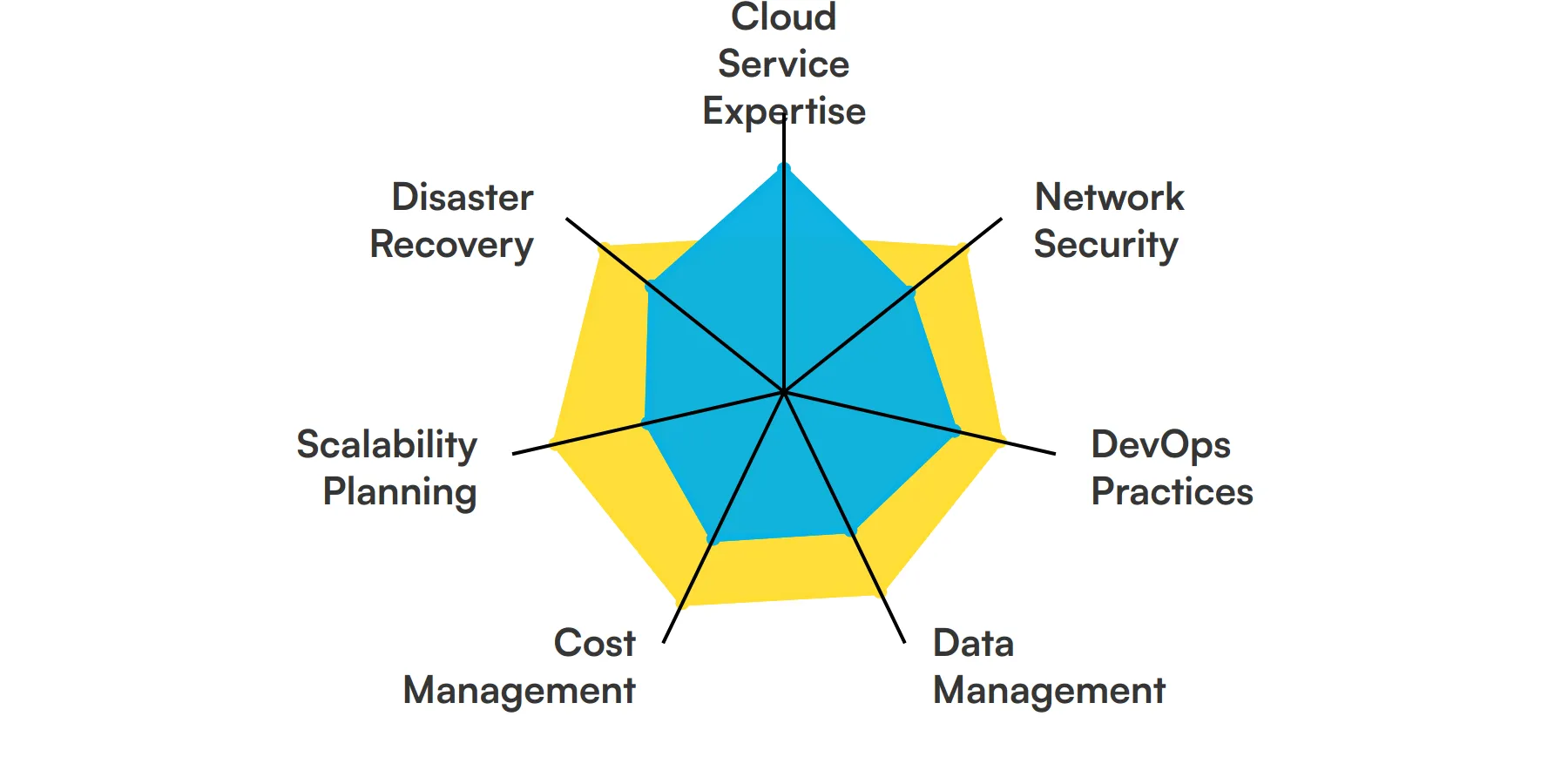
Cloud Service Expertise
A Cloud Architect must be deeply familiar with various cloud services and platforms such as AWS, Azure, or Google Cloud. This knowledge allows them to design scalable, secure, and efficient cloud solutions tailored to specific organizational needs.
For more insights, check out our guide to writing a Cloud Architect Job Description.
Network Security
Security is paramount in cloud architecture. A Cloud Architect uses their understanding of network security to safeguard data and applications in the cloud, implementing protocols like firewalls, intrusion detection systems, and encryption.
DevOps Practices
Implementing and managing DevOps practices is essential for a Cloud Architect. This skill ensures continuous integration and delivery, facilitating faster and more reliable software builds and deployments.
Data Management
Effective data management is critical for Cloud Architects to ensure accessibility, reliability, and speed of data retrieval. They design data storage solutions that are both cost-effective and compliant with data protection regulations.
Check out our guide for a comprehensive list of interview questions.
Cost Management
Cloud Architects must optimize the cost of cloud solutions without compromising performance. They analyze and adjust resources to manage expenses, ensuring the cloud infrastructure is both effective and economical.
Scalability Planning
Scalability is a key consideration in cloud architecture. Cloud Architects plan and implement systems that can scale seamlessly with increasing demand, ensuring stability and performance under varying loads.
Disaster Recovery
Designing disaster recovery strategies is a critical role of a Cloud Architect. They ensure that services can be quickly restored after a disruption, minimizing downtime and data loss.
7 secondary Cloud Architect skills and traits
The best skills for Cloud Architects include API Integration, Performance Analysis, Compliance Knowledge, Automation Tools, Containerization, Multi-cloud Environments and Client Communication.
Let’s dive into the details by examining the 7 secondary skills of a Cloud Architect.
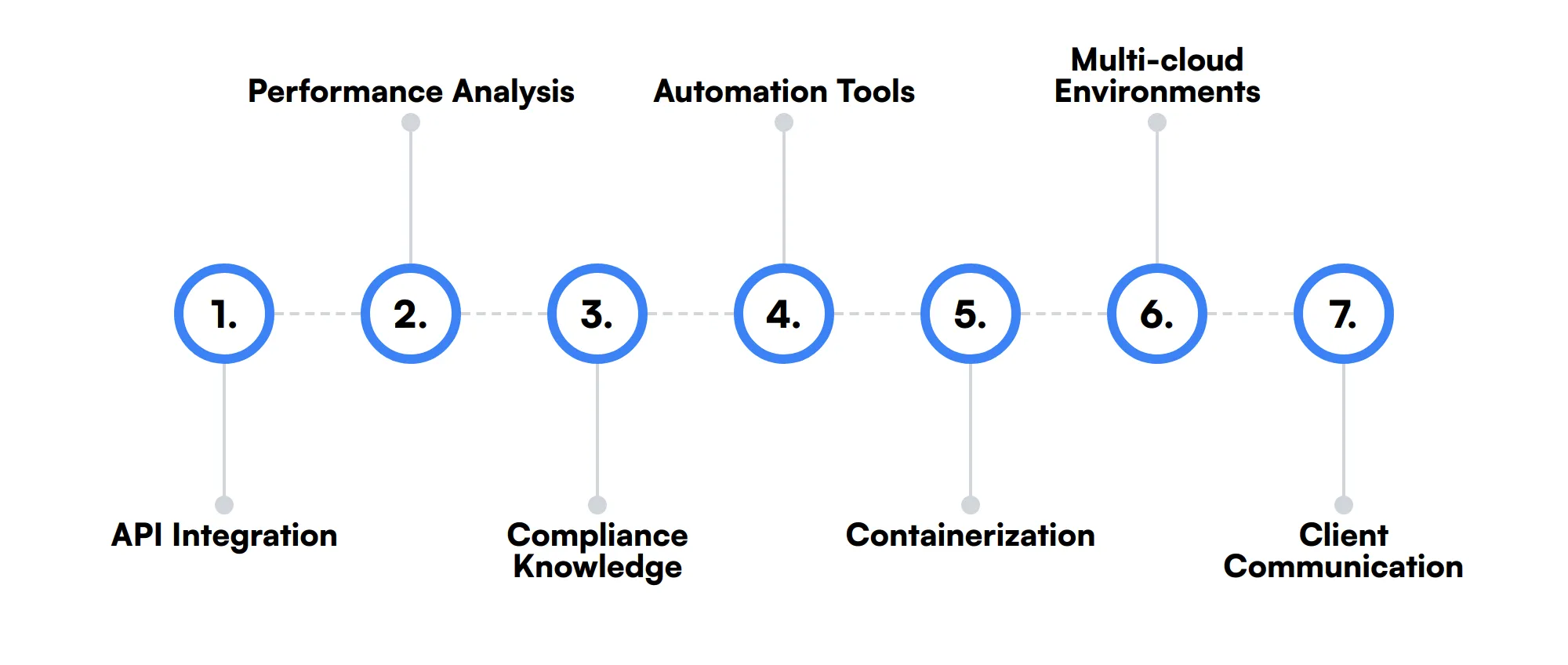
API Integration
Cloud Architects often need to integrate multiple systems via APIs. This skill is important for creating a cohesive cloud environment where different services communicate effectively.
Performance Analysis
Monitoring and improving the performance of cloud systems is a key task for Cloud Architects. They use various tools to track performance metrics and identify bottlenecks.
Compliance Knowledge
Understanding compliance requirements is necessary for Cloud Architects to ensure that cloud architectures adhere to legal and regulatory standards.
Automation Tools
Familiarity with automation tools helps Cloud Architects streamline operations and reduce the need for manual intervention, making cloud management more efficient.
Containerization
Knowledge of container technologies like Docker and Kubernetes is beneficial for Cloud Architects, as these tools help in deploying applications in a scalable and isolated environment.
Multi-cloud Environments
Managing multi-cloud environments is becoming increasingly common. Cloud Architects need to be adept at navigating and orchestrating multiple cloud platforms simultaneously.
Client Communication
Effective communication with clients and stakeholders is important for Cloud Architects to understand requirements and convey technical information clearly.
How to assess Cloud Architect skills and traits
Assessing the skills and traits of a Cloud Architect involves more than just glancing at their resume. While a resume might highlight their familiarity with Cloud Service Expertise or Disaster Recovery, it doesn't provide a clear picture of their hands-on capabilities or their ability to adapt to new challenges.
To truly understand if a candidate can handle the complexities of cloud architecture, including Network Security, Data Management, and Scalability Planning, you need a method that tests these skills in action. This is where practical assessments come into play.
Using Adaface assessments, you can create customized tests that not only cover technical knowledge in areas like DevOps Practices and Cost Management but also simulate real-world problems that the architect will need to solve on the job. This approach not only helps in identifying the most skilled candidates but also ensures a good fit for your specific needs. Learn more about crafting your custom assessment here: Adaface Assessments.
Let’s look at how to assess Cloud Architect skills with these 4 talent assessments.
Cloud Computing Online Test
The Cloud Computing Online Test evaluates a candidate's knowledge and understanding of various aspects of cloud computing. It assesses proficiency in topics such as cloud service models, deployment models, virtualization, security, scalability, storage and database management, networking, and orchestration.
The test assesses their understanding of cloud service models, deployment models, virtualization, security, scalability, storage and database management, networking, and orchestration. Candidates must demonstrate their ability to navigate through these topics and apply their knowledge in practical scenarios.
Successful candidates have a strong grasp of cloud service models, deployment models, and virtualization. They also show proficiency in cloud security, scalability, and database management, which are critical for effective cloud architecture.
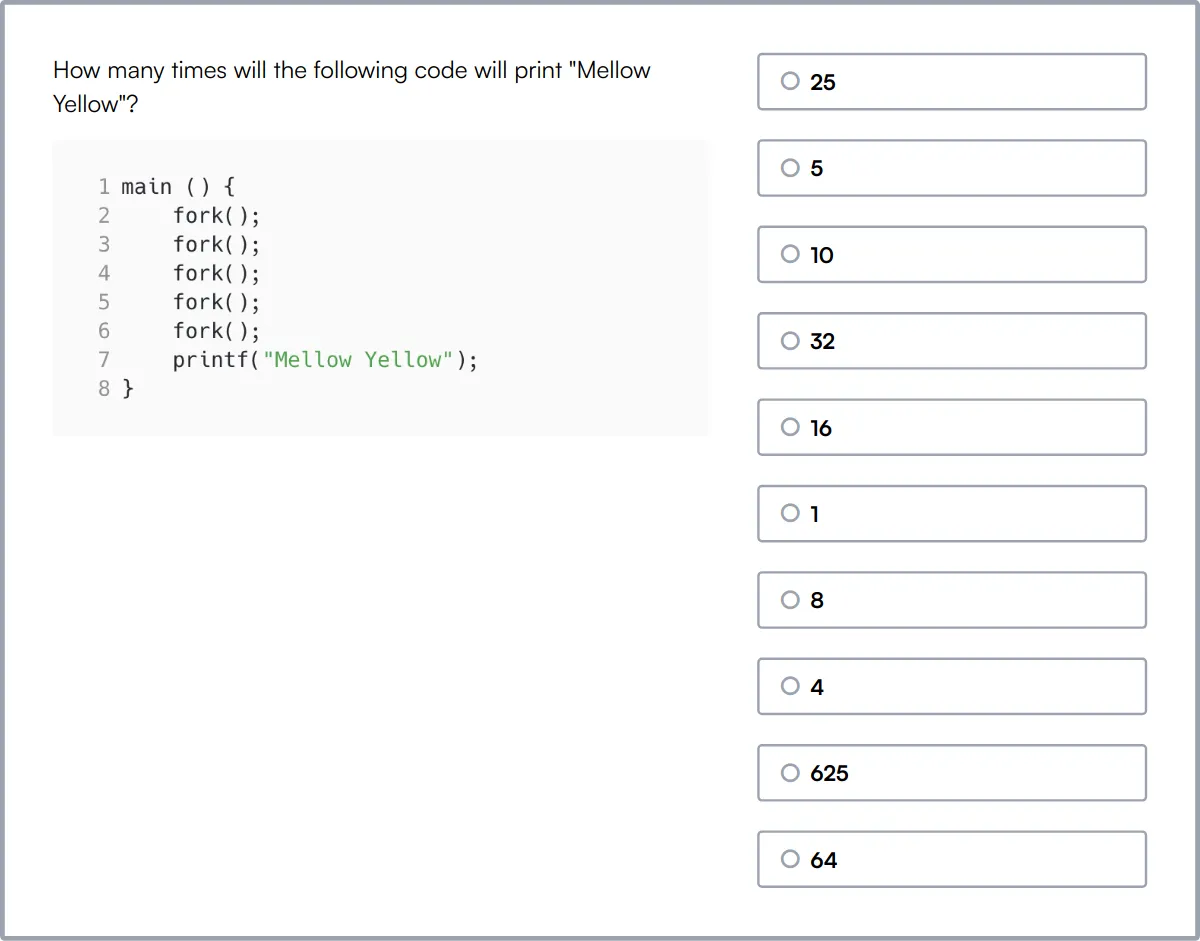
CISCO Security Online Test
The Cisco Security Online Test uses scenario-based MCQs to evaluate candidates on their understanding of network security concepts and Cisco network security products and solutions. The test assesses candidates on their knowledge of security technologies, such as firewall, VPN, intrusion prevention, and content security, as well as their ability to design and implement secure network architectures using Cisco products.
This test assesses their understanding of Cisco firewall, VPN, intrusion prevention, and content security. Candidates must demonstrate their ability to design and implement secure network architectures using Cisco products and solutions.
High-scoring candidates show a deep understanding of Cisco security appliances and solutions. They are proficient in network security concepts, access control, and identity management, which are essential for maintaining secure network environments.
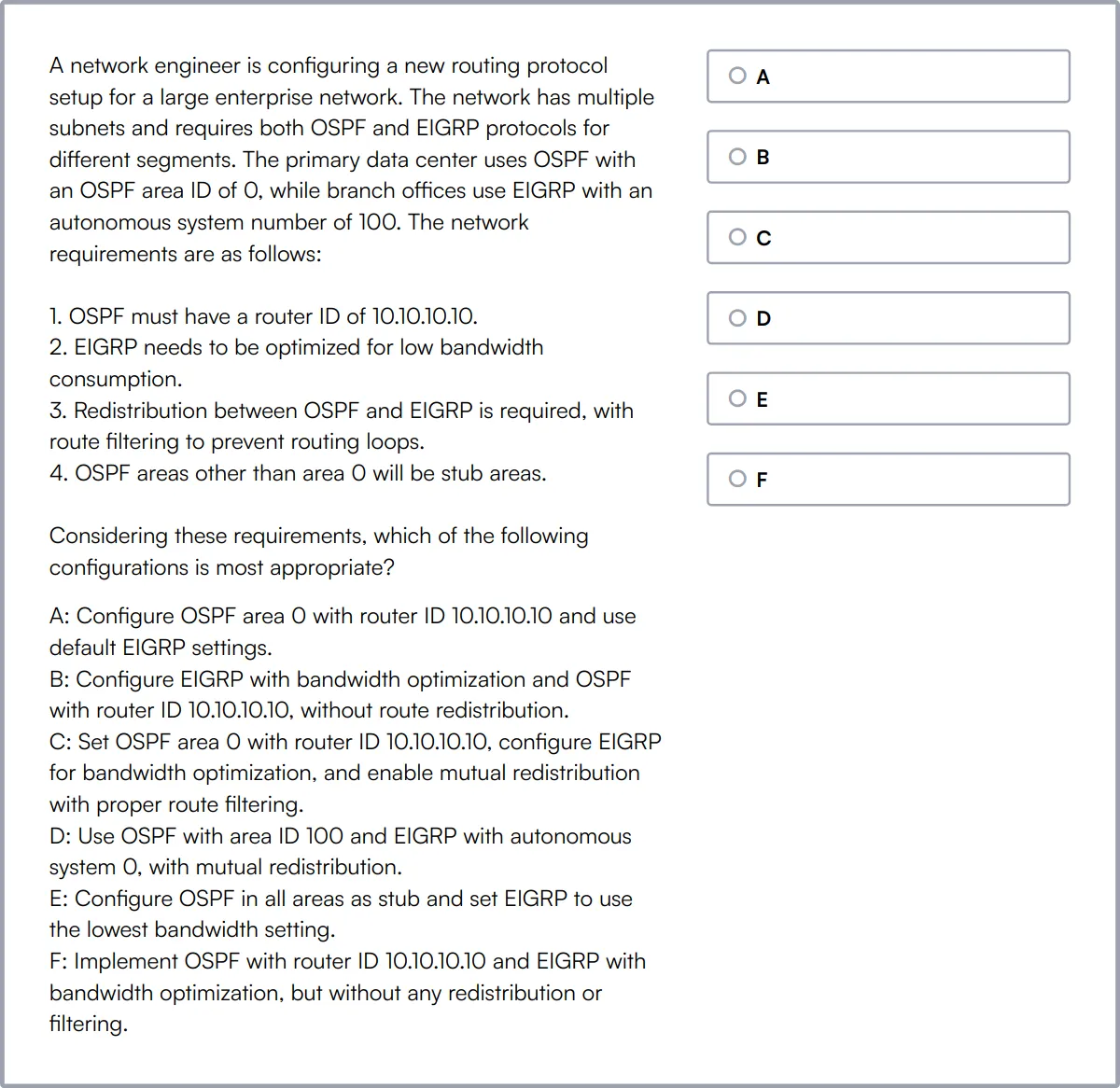
DevOps Test
The DevOps Test is a scenario-based online test designed to assess a candidate's proficiency in working with Linux, Git, Python, Docker, and DevOps skills.
The test assesses their understanding of Git basics, workflows, and branching models, Docker containers and volumes, Linux commands, shell scripting, and Python fundamentals. Candidates must demonstrate their ability to navigate through these topics and apply their knowledge in practical scenarios.
Successful candidates have a strong grasp of Git, Docker, and Linux. They also show proficiency in Python scripting and web scraping, which are critical for effective DevOps practices.
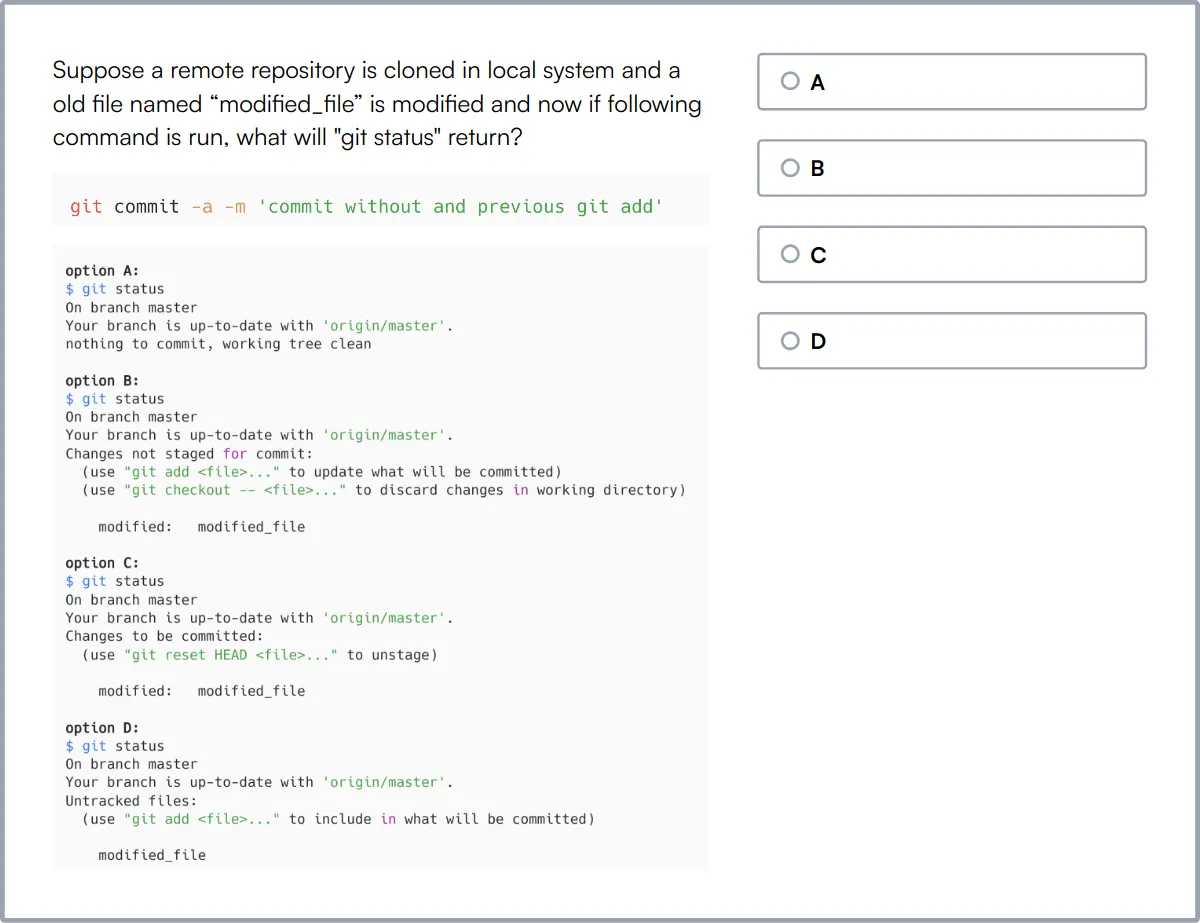
CISCO Data Center Online Test
The CISCO Data Center Online Test evaluates a candidate's knowledge and skills related to various aspects of data center operations. It covers topics such as data center networking, Cisco UCS, storage area networks, data center security, virtualization, and network architecture.
The test assesses their understanding of data center networking, Cisco UCS, storage area networks, and data center security. Candidates must demonstrate their ability to navigate through these topics and apply their knowledge in practical scenarios.
High-scoring candidates show a deep understanding of data center networking and Cisco UCS. They are proficient in data center security, virtualization, and network architecture, which are essential for maintaining efficient data center operations.
Summary: The 7 key Cloud Architect skills and how to test for them
| Cloud Architect skill | How to assess them |
|---|---|
| 1. Cloud Service Expertise | Evaluate familiarity with various cloud platforms and their specific services. |
| 2. Network Security | Assess understanding of securing networks against various threats and vulnerabilities. |
| 3. DevOps Practices | Check proficiency in continuous integration and continuous deployment workflows. |
| 4. Data Management | Review ability to organize, store, and secure data efficiently. |
| 5. Cost Management | Test knowledge in optimizing and reducing cloud expenses. |
| 6. Scalability Planning | Judge capability to design systems that grow with user demand. |
| 7. Disaster Recovery | Examine strategies for data backup and recovery processes. |
Cloud Computing Online Test
Cloud Architect skills FAQs
What is the importance of Cloud Service Expertise in a Cloud Architect role?
Cloud Service Expertise ensures that a Cloud Architect can select and manage the right cloud services for a business, optimizing performance and cost.
How can recruiters assess Network Security skills in Cloud Architect candidates?
Recruiters can assess Network Security skills by asking candidates about their experience with firewalls, VPNs, and encryption protocols, and by reviewing their past projects.
Why are DevOps Practices relevant for Cloud Architects?
DevOps Practices help Cloud Architects streamline development and operations, ensuring faster deployment and better collaboration between teams.
What should recruiters look for in a candidate's Data Management skills?
Recruiters should look for experience with databases, data storage solutions, and data migration strategies to ensure effective data management.
How can a Cloud Architect manage costs effectively?
A Cloud Architect can manage costs by optimizing resource usage, selecting cost-effective services, and implementing cost monitoring tools.
What is the role of Scalability Planning in cloud architecture?
Scalability Planning ensures that cloud solutions can handle growth in users and data without performance degradation.
How do Cloud Architects handle Disaster Recovery?
Cloud Architects handle Disaster Recovery by implementing backup solutions, failover mechanisms, and recovery plans to minimize downtime.
Why is API Integration important for Cloud Architects?
API Integration allows Cloud Architects to connect different services and applications, enabling seamless data flow and functionality.

40 min skill tests.
No trick questions.
Accurate shortlisting.
We make it easy for you to find the best candidates in your pipeline with a 40 min skills test.
Try for freeRelated posts
Free resources



